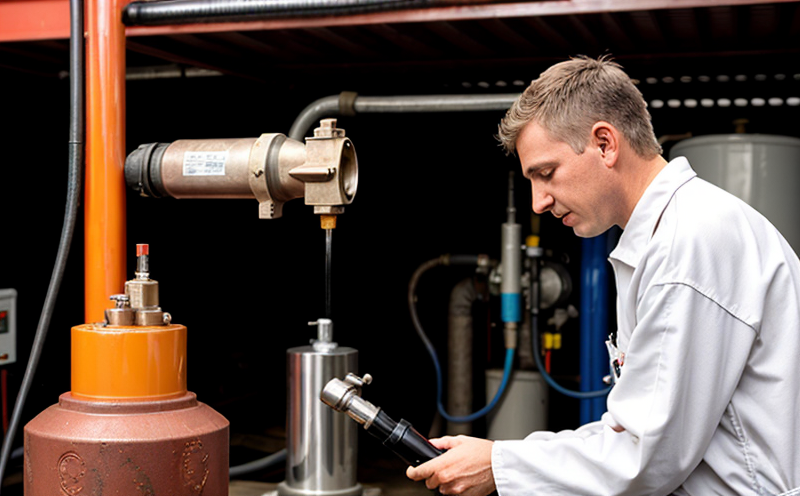ASTM D7567 Gas Chromatography Testing of Jet Fuels
The ASTM D7567 standard provides a comprehensive methodology for analyzing the composition and quality of jet fuels using gas chromatography (GC). This testing is essential in ensuring that fuel meets the stringent requirements set by regulatory bodies, such as the International Civil Aviation Organization (ICAO), to guarantee safe and efficient aircraft operations.
The primary objective of ASTM D7567 GC testing is to identify and quantify various components present within jet fuels. This includes hydrocarbons, alcohols, aromatics, and other additives that can affect the fuel's performance in terms of combustion efficiency, thermal stability, and compatibility with engine hardware. Accurate analysis helps prevent operational issues, such as fuel system blockages or reduced engine lifespan.
Compliance with ASTM D7567 ensures that jet fuels adhere to international standards, which are critical for maintaining the integrity of aircraft engines and reducing environmental impact through optimized fuel use. The test procedure involves several key steps: sample preparation, injection into the GC instrument, separation and detection of individual components, and data analysis.
For effective testing, laboratories must employ advanced instrumentation like high-performance liquid chromatographs (HPLC) equipped with flame ionization detectors (FID). These tools enable precise measurement down to parts per million (ppm), providing reliable results that are vital for decision-making in quality control and R&D processes.
The testing process begins by collecting representative samples from the fuel source. Careful sample handling is crucial to avoid contamination or degradation, which could lead to inaccurate test outcomes. Once prepared, samples are injected into the GC system where they undergo separation based on molecular size and polarity before being detected by the FID.
Data generated from this process is analyzed according to ASTM D7567 guidelines to ensure all components fall within acceptable ranges specified by industry standards. Any deviations may indicate potential quality issues that need addressing through further investigation or corrective actions such as reprocessing or blending adjustments.
| Component Type | Description |
|---|---|
| Alkanes | Saturated hydrocarbons forming the base of jet fuel composition. |
| Aromatics | Chemically active compounds enhancing combustion efficiency. |
| Naphthenes | Cyclic hydrocarbons contributing to thermal stability. |
| Olefins | Unsaturated hydrocarbons influencing volatility and anti-knock properties. |
The results of ASTM D7567 GC testing provide critical insights into the quality attributes of jet fuels, helping stakeholders make informed decisions regarding procurement, blending, and operational strategies. By adhering to these standards, laboratories can ensure consistent fuel quality across diverse applications.
Why It Matters
- Ensures compliance with international aviation regulations.
- Aids in maintaining high levels of engine performance and reliability.
- Promotes operational safety by minimizing risks associated with fuel-related incidents.
- Saves costs through optimized fuel utilization and reduced maintenance expenses.
The importance of ASTM D7567 testing cannot be overstated, especially given the critical role played by jet fuels in modern aviation. By adhering to these standards, laboratories contribute significantly to the overall safety and efficiency of global air travel.
Customer Impact and Satisfaction
- Enhanced trust among customers who rely on accurate fuel quality assessments.
- Promotes long-term business relationships through consistent, reliable service delivery.
- Facilitates timely decision-making by providing actionable data from rigorous testing procedures.
- Maintains regulatory compliance, thereby reducing legal risks for customers operating in aviation sectors.
Our clients appreciate the expertise and precision offered by our ASTM D7567 GC testing services. This commitment to quality not only meets but exceeds industry expectations, ensuring that they remain competitive in a rapidly evolving market.
Use Cases and Application Examples
| Application Scenario | Description |
|---|---|
| Aircraft Manufacturer Quality Assurance | Ensuring that all fuel batches meet the stringent requirements for new aircraft models. |
| R&D Departments Exploring Alternative Fuels | Evaluating novel components and additives to enhance fuel performance. |
| Airport Fuel Suppliers Compliance Monitoring | Verifying that supplied fuels comply with local and international standards. |
| Regulatory Authorities Setting Standards | Establishing benchmarks for acceptable fuel compositions based on scientific evidence. |
The diverse applications of ASTM D7567 GC testing underscore its relevance across various stakeholders within the aerospace and aviation industries. Whether it's ensuring fuel quality during production, exploring new technologies in R&D, or maintaining regulatory compliance at airports, this method plays a pivotal role.





